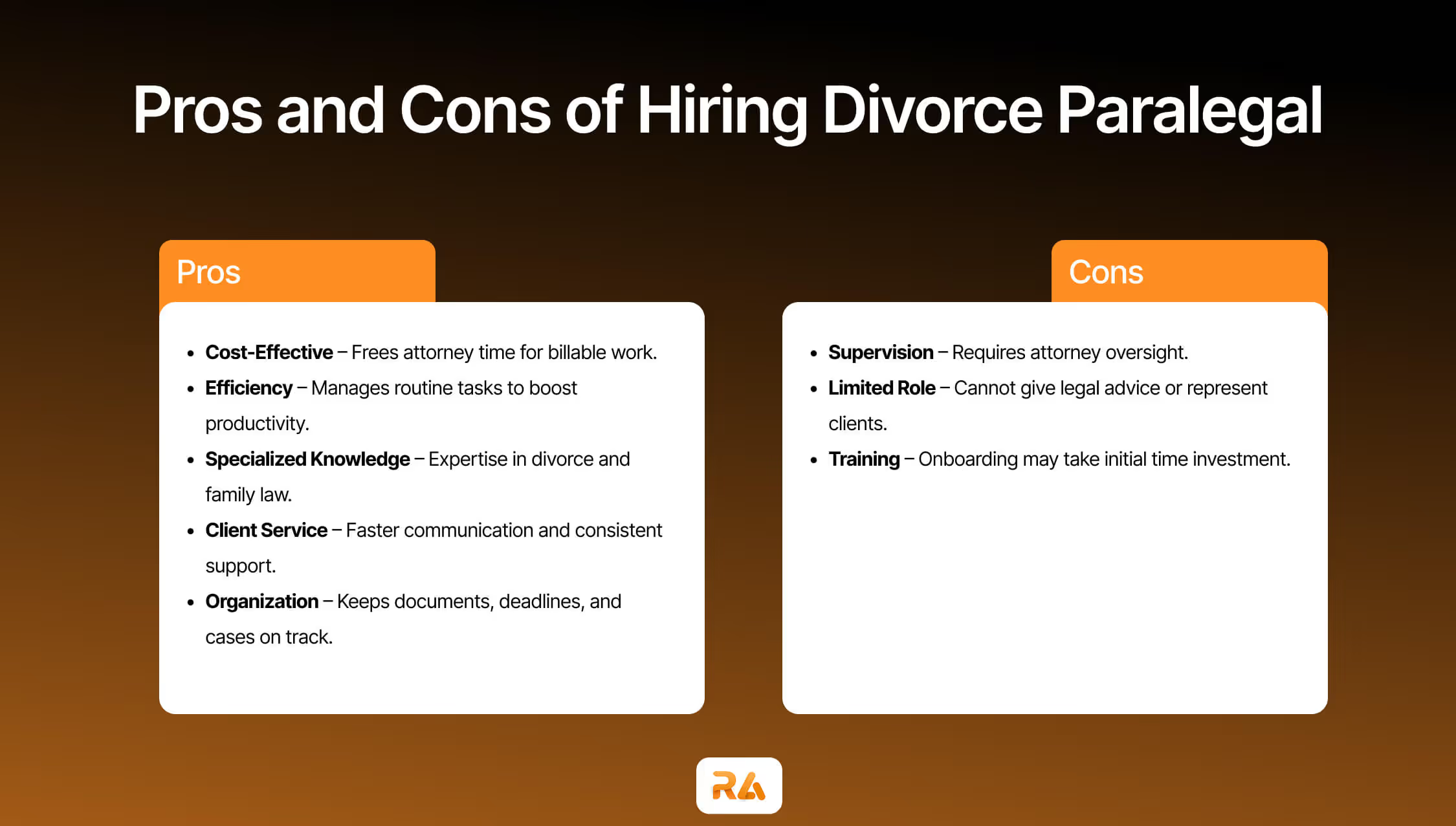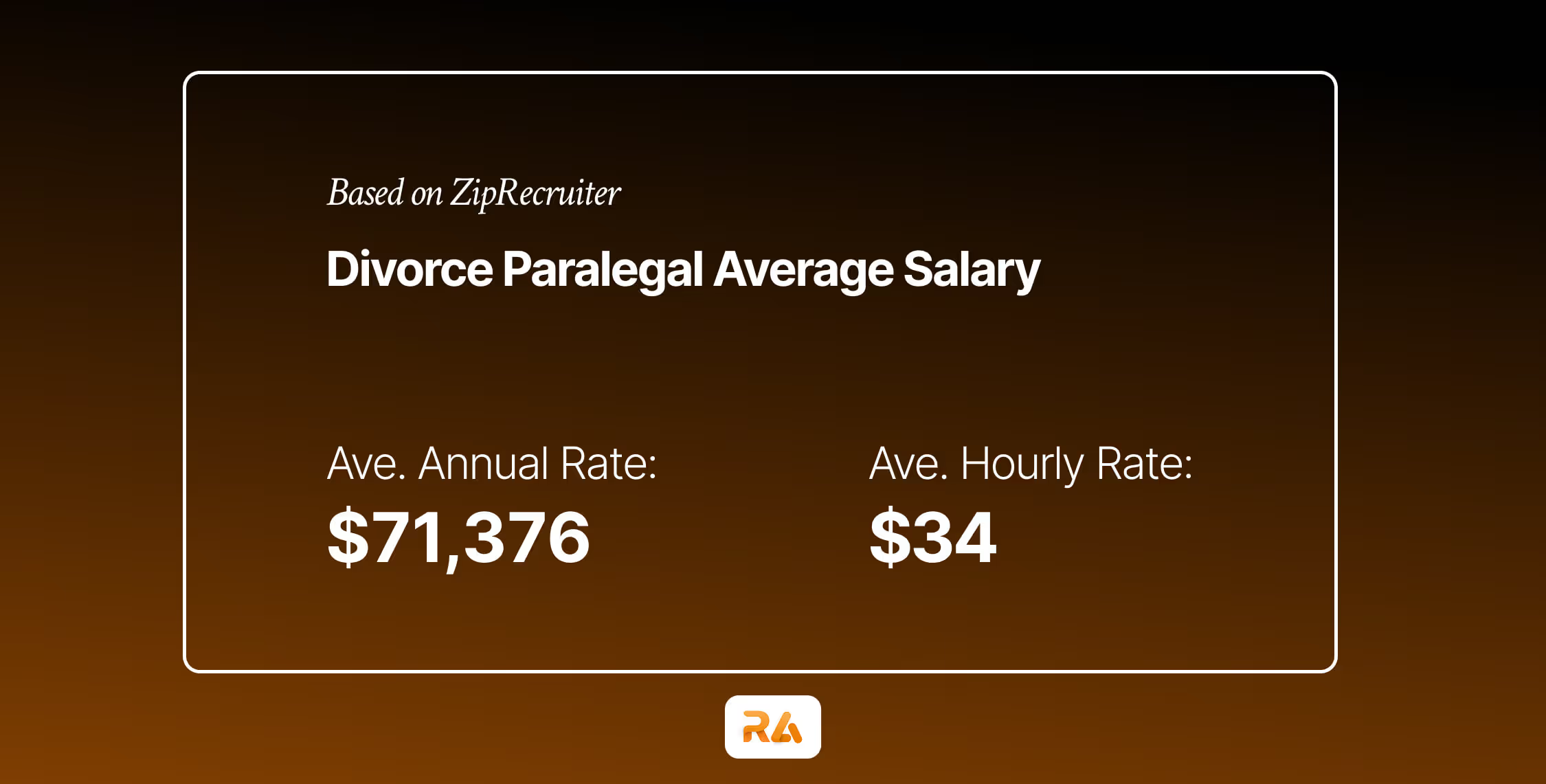As a family law attorney, you're no stranger to the relentless demands of divorce cases. Between client consultations, court appearances, and case strategy development, your days are packed with competing priorities that pull your attention in multiple directions. It’s no wonder you may ask whether you're truly operating at maximum efficiency.
The latest data on family law tells a compelling story. Of the 66 million cases handled by state courts annually, nearly 6% involve family law matters, with divorce cases leading the charge. In 2023 alone, courts processed 672,502 divorce cases, at a rate of 2.4 divorces per 1,000 population. These statistics highlight a persistent reality: divorce remains a significant area of legal practice with steady demand.
Yet this consistent caseload presents both opportunity and challenge. While the demand creates room for client base growth, it also means family lawyers are increasingly stretched thin, struggling to provide the personalized attention their clients deserve while maintaining profitability and work-life balance. This is where working with a divorce paralegal can make a meaningful difference.
What is a Divorce Paralegal?
A divorce paralegal is a legal professional who specializes in assisting attorneys with family law and divorce cases. They are specifically trained and possess knowledge in divorce procedures, legal separation, and state laws governing family-related legal matters.
Under the supervision of an attorney, divorce paralegals handle a wide range of administrative and case-support tasks, helping streamline the legal process for attorneys and their clients.
Divorce Paralegal Job Responsibilities
A divorce paralegal provides a wide range of services essential to the workflow of a family law practice. While responsibilities may vary depending on the size of the firm, they typically include the following:
Document Preparation
Divorce paralegals draft pleadings, motions, and settlement agreements. They prepare and file divorce paperwork in compliance with court requirements, reducing the risk of delays or rejections.
Court Filings
They manage filing deadlines and procedural requirements, track case calendars, and maintain accurate records of service to protect client interests.
Legal Research
Paralegals research statutes, case law, and local court rules to strengthen arguments and help divorce attorneys avoid procedural missteps that may weaken a client’s case.
Client Communication
Often serving as the main point of contact, divorce paralegals guide clients through complex processes, explain legal terms in plain language, and provide timely updates.
Discovery Management
They assist with discovery by drafting requests, organizing evidence, and tracking deadlines to ensure no information is overlooked.
Financial Analysis
Divorce paralegals analyze financial records and work with financial experts to prepare materials that ensure fair property division and accurate support determinations
Case Management
Serving as the central coordinator, divorce paralegals maintain organized case files, monitor deadlines, and manage communications with opposing counsel to keep cases progressing.
Trial Preparation
When cases proceed to court, divorce paralegals prepare trial binders, coordinate witness schedules, and compile detailed trial notebooks so attorneys can focus on advocacy.
Education of a Divorce Paralegal
Divorce paralegals have no standardized educational path, and unlike attorneys, they are not required to pass the bar exam. However, most positions require at least an associate degree in paralegal studies or a bachelor’s degree in a related field. Typical coursework in paralegal studies includes legal research and writing, litigation, legal ethics, and negotiation. For reference, the American Bar Association (ABA) provides a list of approved paralegal education programs.
To stand out in the competitive job market, many divorce paralegals pursue certification through organizations such as the National Association of Legal Assistants (NALA) or the National Federation of Paralegal Associations (NFPA). These certifications demonstrate a commitment to professional excellence and typically require ongoing continuing legal education to maintain active status.
Specialization in family law usually develops through direct experience, additional workshops, and on-the-job training. Many paralegals build their divorce law expertise by working in family law practices, where they learn the nuances of local court procedures and judicial preferences.
How to Find Divorce Paralegal Near Me?
To find the right divorce paralegal for your practice, start by checking with your local bar associations. Many state and county bar associations provide online directories where you can search by specialty and location to identify qualified paralegals.
You can also explore online resources such as LinkedIn, legal staffing agencies, and specialized legal job boards, which often feature freelance or contract paralegals available for remote or in-person work.
Finally, don’t overlook word-of-mouth referrals. Recommendations from colleagues, fellow attorneys, and other legal professionals can often lead to reliable candidates with proven experience.
Area of Focus of Divorce Paralegal
Within family law, divorce paralegals may focus on several specialized areas, including:
Uncontested Divorce
In an uncontested divorce, where both parties agree on all terms, paralegals streamline the process by preparing petitions, marital settlement agreements, and other required court forms. They also handle court submissions to help expedite the finalization of the divorce.
Contested Divorce
For a contested divorce, where spouses disagree on issues, a paralegal is instrumental in the discovery phase. They gather financial records, prepare discovery requests, and manage the large volume of information exchanged between parties. Their efforts help attorneys maintain detailed case timelines throughout lengthy proceedings.
Child Custody & Visitation
Paralegals prepare documents for parenting plans and custody filings. They also organize supporting evidence such as school records, medical reports, and communication logs to strengthen custody cases.
Child Support
A divorce paralegal collects and organizes financial records, including income statements and tax returns, to assist divorce attorneys in calculating and presenting child support obligations.
Spousal Support (Alimony)
Similar to child support, paralegals collect and analyze financial disclosures from both parties, documenting all income, expenses, and assets. This preparation helps attorneys assess the need for alimony and determine fair support amounts.
Property & Asset Division
Divorce paralegals assist in locating and organizing documents related to real estate, bank accounts, investments, and debts. They compile asset inventories, coordinate appraisals, and manage disclosures to ensure equitable property division.
Post-Judgment Modifications
After a divorce is finalized, circumstances may change, requiring updates to existing court orders. Divorce paralegals assist by preparing motions and supporting documents to request modifications to orders involving child support, custody, or spousal support.
Mediation & Settlement Support
Divorce paralegals provide support by organizing all relevant documents and information before the negotiation begins. They maintain detailed records of mediation sessions and ensure that the terms agreed upon by both parties are accurately documented in the final legal agreements.
Pros and Cons of Hiring One

With nearly 56,970 family law and divorce lawyers competing in the U.S., efficiency has become a top priority for attracting clients and maintaining competitiveness. Having divorce paralegal support plays a critical role in achieving this balance. Before deciding to hire a divorce paralegal, let's break down their advantages and limitations.
Pros:
- Cost-Effective. Delegating routine tasks to a paralegal frees up more of your time for billable hours.
- Enhanced Efficiency. They handle behind-the-scenes work, enabling you to focus on legal strategy, court appearances, and high-value client interactions.
- Specialized Knowledge. Their focused knowledge of divorce and family law strengthens case preparation and support.
- Improved Client Service. With additional support, clients benefit from faster communication and more consistent attention.
- Better Case Organization. They are trained to manage documents, deadlines, and files, helping keep complex cases organized.
Cons:
- Supervision Required. Like any type of paralegals, they require attorney oversight, particularly on complex legal issues.
- Limited Scope of Work. Paralegals cannot provide legal advice or represent clients in court.
- Initial Training. In some cases, there is an initial investment in time to onboard and train a new paralegal on your firm's specific procedures.
Advantage of Having Divorce Paralegals Near you
Having a divorce paralegal nearby offers several practical benefits. Their local availability allows them to hand-deliver time-sensitive documents and respond quickly to last-minute court requirements or emergencies, helping you avoid costly delays.
In addition, local paralegals bring valuable expertise in court procedures and personnel. Their familiarity with judge preferences, clerk requirements, and informal practices that vary by jurisdiction can result in faster turnaround times and smoother case management.
How Much Does It Cost to Hire a Divorce Paralegal?

The cost of hiring a divorce paralegal can vary based on experience, location, and specialization. In the United States, the average hourly rate is about $34, with higher rates in metropolitan areas compared to rural regions due to market demand and cost of living.
On an annual basis, divorce paralegals earn an average salary of around $71,376 nationwide. To avoid hidden costs, it’s important to clarify what is included in quoted rates and which expenses may fall on the client or firm.
At Remote Attorneys, our paralegals offer straightforward pricing, with rates starting at $17 per hour. This allows firms to save up to 50% compared to in-house paralegals, while maintaining the high standards of quality and reliability you expect.

Do I Need a Divorce Paralegal Near Me?
Since law practices don’t all operate under the same circumstances, your decision to hire a divorce paralegal near you depends on your current practice setup, case complexity, and budget. For example, simple uncontested divorces with minimal assets rarely justify hiring a paralegal. On the other hand, complex cases involving significant assets, child custody disputes, or business valuations benefit greatly from paralegal support.
The document volume and coordination requirements in these matters often exceed what attorneys can manage alone. To make the investment more effective, consider starting with project-based arrangements to assess whether a divorce paralegal’s skills align with your needs before committing to ongoing support.

If you’re searching for a divorce paralegal near you, know that technology has removed many location constraints. Remote paralegals have become a go-to option for law firms, providing reliable support no matter where you are. To explore more, schedule a consultation with our team for a customized solution tailored to your divorce law needs.



.webp)
